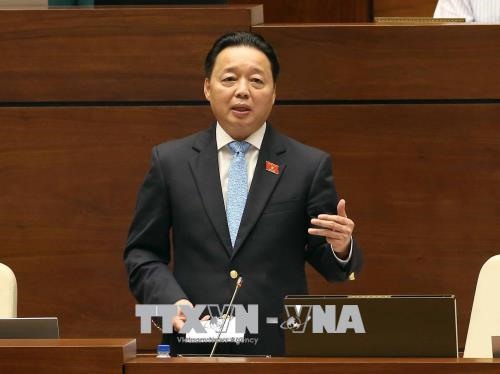 Politics & Law
Politics & Law

Minister of Natural Resources and Environment Trần Hồng Hà continued to answer questions on land and environmental issues during a question-and-answer session at the National Assembly on Tuesday.
 |
| Minister of Natural Resources and Environment Trần Hồng Hà. — VNA/VNS Photo |
HÀ NỘI — Minister of Natural Resources and Environment Trần Hồng Hà continued to answer questions on land and environmental issues during a question-and-answer session at the National Assembly on Tuesday.
Some deputies said the ministry has put many measures in place to deal with environmental pollution but it persisted in many localities, seriously affecting the life and livelihood of people, who are now asking for initial and long-term solutions to address the issue.
Hà said environmental pollution in general and environmental pollution along rivers was one of many key problems at present, but pollution caused by rubbish from factory waste discharge, industrial zones and traditional craft villages, among others, was the most urgent issue.
He said a number of measures, including clearly defining the responsibilities of each locality with regard to their own waste sources, mobilising the entire community in the waste collection, and investing in modern waste treatment technology with the target of reducing dumped wastes to 7 per cent by 2025, would be put in place soon to deal with the issue.
Deputy Phạm Tất Thắng from southern Vĩnh Long Province, said most industrial zones lacked waste collection and treatment infrastructure and technology, leading to the discharge of untreated waste into the environment.
Minister Hà said the Prime Minister has issued a decree on the management of industrial zones and localities. Natural resources and environment departments at localities were also required to increase inspection and supervision on waste collection and treatment of industrial zones. Those found to cause pollution adversely affecting local residents’ living conditions would be forced to cease operations.
“Authorised agencies have submitted a proposal to the Prime Minister for the issuance of a waste management strategy with focus on waste treatment technology,” he added.
Land management
Some deputies raised the issue that many projects were not implemented or were implemented poorly even after people’s lands in many areas were revoked for construction projects, causing great concern among the public.
Hà admitted delayed projects were still a persistent problem in localities due to the weak capacity of investors, a lack of penal mechanisms, and the overlapping of relevant laws and regulations.
He said a project should be revoked if businesses failed to implement it 12 months after schedule. “It is necessary to reconcile this difference between the land law and the investment law,” he said. According to the 2013 Land Law, projects that are 24 months behind schedule are subject to revocation. The Investment Law, on the other hand, provides a timeframe of 12 months.
Regarding land compensation and transfer, Minister Hà said there were clear regulations on compensation and settlement but authorities of some localities violated laws by allowing changes in the land purpose or failing to effectively manage the land fund and resettlement land.
The ministry would work closely with relevant ministries and agencies to improve management and increase inspection and supervision efforts over land transfer at localities, he said.
Deputy PM Trịnh Đình Dũng clarified certain issues relating to land management, saying that shortcomings remained in land management in some localities due mainly to a lack of public spaces in residential buildings, land leasing for urban development projects failing to meet urban developing planning requirements, the use of land for wrong purposes, and construction without licence. Illegal land purchase and construction were complex problems that have to be tackled in Phú Quốc, Bắc Vân Phong and Vân Đồn, he said.
To address the issues, Dũng proposed a continuation of review and adjustment for land use plans, increased attention to land use for transport infrastructure, and public spaces for local residents. It is necessary to publicise information relating to land planning, tourism development, and urban development plans to enable the public to participate in investment, management and supervision of land management issues, while authorised agencies need to strictly inspect proposed changes of land use purposes, he said.
Later at the event, Minister of Labour, Invalids, and Social Affairs Đào Ngọc Dung is expected answer questions about the labour market situation in the country, including generating jobs for locals and sending workers abroad in addition to solutions for the improvement of the quality of vocational training, care and protection of children, and addressing child abuse and violence against children. — VNS




